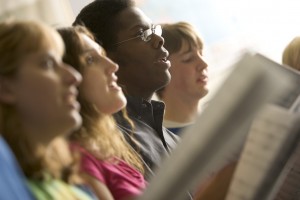By Scott Aniol
Here’s on of the most important concepts about music in worship I think needs to be communicated to pastors and parishioners alike:
Music in the context of corporate worship is not primarily about giving people an authentic expression through their preferred musical style. Music in worship is (as is liturgy and preaching) formative. It shapes right spiritual responses to God’s truth. It is as part of teaching and discipleship as preaching is.
Most Christians today assume that the styles of music chosen for worship are merely preference, like whether we put in red carpet or blue carpet, and thus accommodation to what is comfortable for various demographics in the church for the sake of unity is better than deciding which styles are best.
Color of the carpet? Yes. Merely preference, so let’s accommodate.
Music? No, because it’s not about comfort or preference but rather about what kinds of music best fit the weight of biblical doctrine, best express the kinds of reverent affections appropriate for expression to God, and best form mature, sober-minded Christians.
No, I do not believe there is only one style or time period that is acceptable. Hardly. I believe there are many, many varied styles and cultural expressions that are appropriate, and this variety is evident in the rich traditions cultivated over hundreds of years by God’s people. What I object to is the notion that all styles are fitting.
Nor do I think people can’t have preferences. They certainly may.
But it seems to me that most discussions about musical style in worship are predicated on the assumption that the purpose of music in worship is to give people a voice to their heart’s expression, and naturally whatever is most comfortable to them should be encouraged.
Yet I repeat: music is not just or even primarily about expression in worship; it is about forming mature, sober-minded worshipers.

About Scott Aniol
Scott Aniol is the founder and Executive Director of Religious Affections Ministries. He is on faculty at Southwestern Baptist Theological Seminary, where he teaches courses in worship, hymnology, aesthetics, culture, and philosophy. He has written two books, dozens of articles, and speaks around the country in churches and conferences. He is an elder in his church in Fort Worth, TX where he resides with his wife and two children.
From: Religious Affections





Leave a Reply